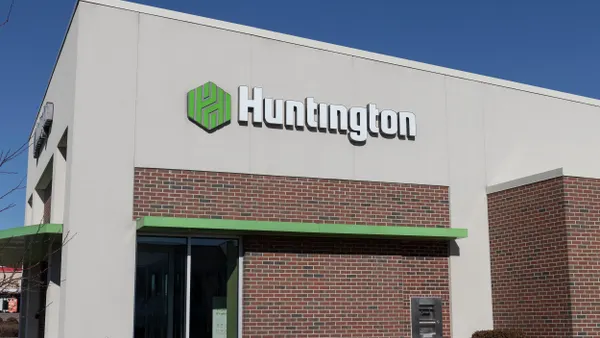Dive Brief:
- Community banks, the main lenders to small businesses and farmers in the U.S., will be among the financial sector's hardest hit as the U.S. trade war with China continues to escalate, said Mayra Rodriguez Valladares, a capital market consultant and trainer who works with banks on risk and management issues.
- President Donald Trump tweeted Thursday that he will add a 10% tariff on $300 billion in Chinese goods coming into the U.S. starting Sept. 1. This follows a 25% hike the president already imposed on $250 billion worth of China's imports.
- Trump said he made the decision after China failed to buy large quantities of American agricultural products, something he said Chinese delegates promised during a summit in June.
Dive Insight:
U.S. farmers, particularly in the soybean export market, have been among the most negatively affected by the trade war.
China bought roughly half of the U.S.'s soybean exports before the start of the trade war, according to CNBC, which cited U.S. Department of Agriculture data.
China's retaliation against the Trump administration's duties on their goods has caused the value of the exports to the country to fall 74% to $3.1 billion last year, from about $12.2 billion in 2017.
Total U.S. farm debt is expected to rise to $426.7 billion this year, approaching levels seen in the 1980s farm crisis, according to the USDA.
"These tariff issues really do have a significant impact on multiple different kinds of financial institutions," Valladares told Banking Dive. "But the banks that will feel the pinch more immediately are the community banks because they're the ones that go and lend to the small [and] medium-sized companies in their respective districts. And they're also the ones that are most affected by the agriculture sector."
Large national banks will still feel the impact from the tariffs. Bank stocks tumbled Thursday, following Trump's tweet. But those larger institutions are more adept at managing risks, Valladares said.
"The top 20 banks in the United States, the ones that have trading portfolios ... can jump in and try to get a derivative or try to do some quick asset reallocation when they're getting hit," she said. "When you get below the regional banks, those guys have no flexibility."
Community banks don't have the diversification that larger banks have, leaving them exposed to the industry or agricultural sector they serve, Valladares said.
Top banks are beginning to divest themselves from the sector. A Reuters analysis of the farm-loan holdings they reported to the Federal Deposit Insurance Corp. (FDIC) found that farm-loan portfolios of the nation's top 30 banks declined 17.5%, or $3.9 billion, to $18.3 billion between their peak in December 2015 and March 2019.
In an interview with CNN Business on Wednesday, FDIC Chair Jelena McWilliams said the regulator doesn't have any immediate concerns on the condition of the nation's agricultural banks.
"[The trade war] certainly has had some impact, but it's very difficult to measure because a plethora of different indicators go into assessing why a certain bank is doing well or not doing so well," she said. "Down the road, we will have to see what the implications are."
McWilliams said the FDIC is closely monitoring the St. Louis Federal Reserve Bank's report that the delinquency rate for agriculture loans is at an eight-year high.
"Farm land prices remain high, and so long as the farmers have some equity in their land, there's a way to secure those loans even when delinquencies happen," she said, adding that she did not know if the delinquencies were a direct impact of the trade war.
"I wouldn't go so far as to speculate what the actual cause of it is. It certainly has some impact," she said. "The question is, how do you measure that impact and what exactly is the causality?"













